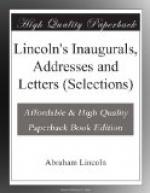I take these “thirty-nine,” for the present, as being “our fathers who framed the Government under which we live.”
What is the question which, according to the text, those fathers understood “just as well, and even better, than we do now?”
It is this: Does the proper division of local from Federal authority, or anything in the Constitution, forbid our Federal Government to control as to slavery in our Federal Territories?
Upon this, Senator Douglas holds the affirmative, and Republicans the negative. This affirmation and denial form an issue; and this issue—this question—is precisely what the text declares our fathers understood “better than we.”
Let us now, inquire whether the “thirty-nine,” or any of them, ever acted upon this question; and if they did, how they acted upon it—how they expressed that better understanding.
In 1784, three years before the Constitution, the United States then owning the Northwestern Territory, and no other, the Congress of the Confederation had before them the question of prohibiting slavery in that Territory; and four of the “thirty-nine” who afterward framed the Constitution were in that Congress, and voted on that question. Of these, Roger Sherman, Thomas Mifflin, and Hugh Williamson voted for the prohibition, thus showing that, in their understanding, no line dividing local from Federal authority, nor anything else, properly forbade the Federal Government to control as to slavery in Federal territory. The other of the four—James McHenry—voted against the prohibition, showing that for some cause he thought it improper to vote for it.
In 1787, still before the Constitution, but while the Convention was in session framing it, and while the Northwestern Territory still was the only territory owned by the United States, the same question of prohibiting slavery in the Territory again came before the Congress of the Confederation; and three more of the “thirty-nine” who afterward signed the Constitution were in that Congress, and voted on the question. They were William Blount, William Few, and Abraham Baldwin; and they all voted for the prohibition—thus showing that, in their understanding, no line dividing local from Federal authority, nor anything else, properly forbade the Federal Government to control as to slavery in Federal territory. This time the prohibition became a law, being part of what is now well known as the Ordinance of ’87.
The question of Federal control of slavery in the Territories seems not to have been directly before the convention which framed the original Constitution; and hence it is not recorded that the “thirty-nine,” or any of them, while engaged on that instrument, expressed any opinion on that precise question.




